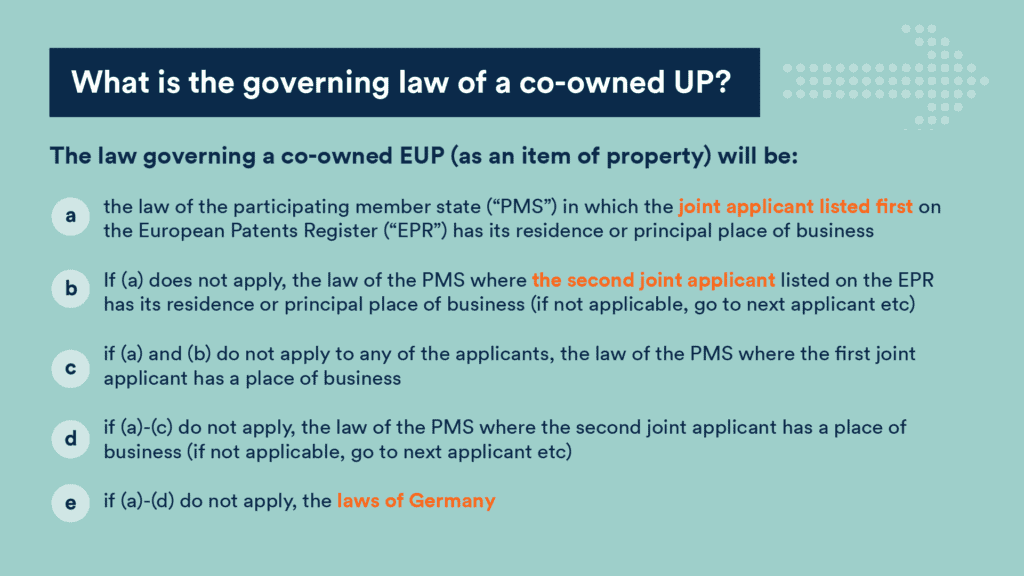Unitary Patents and joint ownership
10.05.2023
The Unitary Patent system is finally due to go live on 1 June 2023 and transitional measures are already in place to assist applicants for European patents to obtain Unitary Patents on the start date (if desired). Now is therefore an important time for innovative companies and institutions to familiarise themselves with this new system.
In addition to taking important decisions such as whether or not to opt out existing European Patents from the jurisdiction of the UPC, companies and institutions should also be considering what impact the new system may have on their future patenting strategies and how these should be reflected in their contractual arrangements. One such point to consider relates to joint ownership of Unitary Patents and the contractual provisions which parties should consider putting in place to implement joint ownership.
It is not uncommon for entities to agree joint ownership of patents, particularly in the context of research collaborations where it is often difficult to clearly distinguish contributions made by each party. Joint ownership can often therefore seem fair and equitable and, if implemented well, can be a workable solution. However, as laws relating to joint ownership vary between jurisdictions there are a number of points which we would recommend joint owners consider and contractually agree between them.
One interesting quirk of the new Unitary Patent system is that the applicable law which governs a Unitary Patent as a piece of property (and which therefore will govern questions such as each party’s ability to exploit, licence and assign a co-owned Unitary Patent) can vary depending on which co-owner is listed first on the patent application. What may therefore at first appear to be an arbitrary decision on who to list first in a patent application, could potentially have long lasting consequences for commercialisation.
Here we discuss the rules which determine the governing law of a co-owned Unitary Patent as an item of property, and the issues that parties should therefore consider agreeing contractually.
What is the governing law of a co-owned Unitary Patent?
The law that governs a Unitary Patent as an item of property depends on the applicant’s principal place of business at the time the patent application is made. Crucially, the governing law of a Unitary Patent will not change during the lifetime of the patent, this remains the case even if the applicant or owner of a Unitary Patent changes in the future.
The rules to determine the governing law of a co-owned Unitary Patent as an item of property involve a somewhat complex multi-step process which we have summarised in the graphic below. The assessment involves identifying whether, at the time the application was made, either of the co-applicants had a principal place of business in a participating member state (PMS), and failing that, any place of business within a PMS. Where neither applicant has a place of business in a PMS, German law will apply. Crucially, it is the principal place of business of the first named joint applicant which is considered first and which will therefore take priority (provided this is within a PMS).

Why it matters
As noted above, laws on joint ownership of patents vary between jurisdictions. For example, under English law, unless there is an agreement to the contrary, co-owners of a patent may each work the patent themselves without consent of the other party. However, co-owners cannot grant licences, assign their rights in the patent, mortgage their share of the patent or amend the patent specification without the consent of the other co-owner(s) (again unless there is an agreement to the contrary). However, different rules apply in different jurisdictions, and while the English law approach may be familiar to institutions and companies operating in the UK, English law will not be a possible governing law of a co-owned Unitary Patent (as the UK is no longer a PMS in the UPC).
Companies and institutions which have a place of business in a PMS, may be more familiar with, and therefore prefer to have the law of that jurisdiction govern their co-owned Unitary Patents as items of property. That being the case, such an applicant may wish to insist on being listed as first co-applicant in the patent application (although whether this is effective to may also depend on whether and where the other co-applicant(s) have a principal place of business).
Points to consider when agreeing joint ownership of a Unitary Patent
While the new Unitary Patent regime does not allow co-owners to decide which laws apply to a Unitary Patent as an item of property, co-owners can agree contractually what rights and obligations each co-owner should have in respect of a jointly owned Unitary Patent (and can agree the law which will govern the relevant contract, which does not have to be the same as the law which governs the Unitary Patent).
As noted above, whenever agreeing joint ownership of a patent (whether a Unitary Patent or otherwise) we would recommended contractually agreeing a certain key points relating to exploitation, management and enforcement of the patent. Agreeing these points contractually can provide co-owners with certainty.
Points that should be considered include:
- As a preliminary point, whether the co-owners will apply for a Unitary Patent, or whether to apply for national patents or classic European patent.
- If parties agree to seek a Unitary Patent, which co-owner should be named first in the application.
- How decisions relating to prosecution and maintenance of the Unitary Patent should be made (e.g. will one party take control, should the other party be consulted, who will pick up costs?).
- Rights to work the patent (e.g. will each party be able to work the patent? Will either party have exclusivity in any particular field? Will either co-owner be required to make payments to the other?).
- Whether either party can grant licences without the consent of the other (and if yes, whether any conditions must be satisfied?).
- Whether either party can assign its rights in the co-owned Unitary Patent to a third party without consent of the other (and if yes, whether any conditions must be satisfied?).
- Rights and obligations to enforce the co-owned Unitary Patent (e.g. will one party take control? Should the other party be consulted? Who will pick up costs? How will damages be shared between the parties?).
Conclusion
The opening of the UPC on 1 June 2023, and the start of the new Unitary Patent system has been long awaited and represents the biggest shake up of European patent law in decades. The new system is set to have a significant impact on innovative companies and institutions and will require parties to make a number of important decisions relating to patent filing and enforcement strategy in Europe. Getting to grips with new rules regarding co-ownership of Unitary Patents (in particular those determining governing law) represents just one of the many aspects of the new system that parties will need to consider and address.
Related material
For a discussion of the various other issues that innovative companies and institutions should consider to make sure that their licensing and collaboration agreements are UPC ready, please see a recording of our Lexology-hosted webinar delivered by Claire Smith and Ellen Lambrix.

Ellen Lambrix
Author
Author
